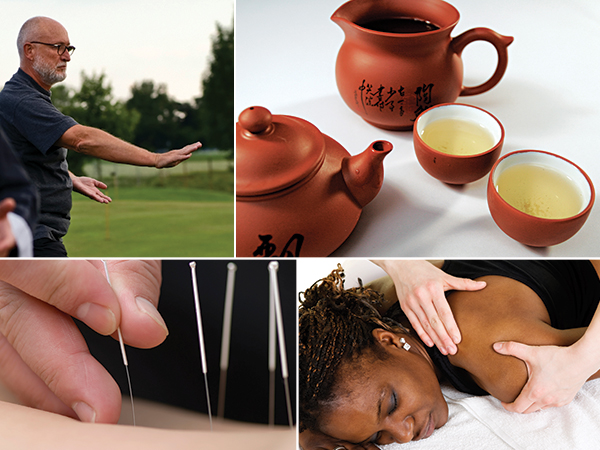Forgoing Conventional Cancer Treatments for Alternative Medicine Increases Risk of Death
Forgoing Conventional Cancer Treatments for Alternative Medicine Increases Risk of Death
September 12, 2017, by NCI Staff
In a large study, patients with nonmetastaticbreast, lung, or colorectal cancer who chose alternative therapies had substantially worse survival than patients who received conventional cancer treatments.
After a median of 5 years, patients with breast or colorectal cancer were nearly five times as likely to die if they had used an alternative therapy as their initial treatment than if they had received conventional treatment.
“Our findings highlight the importance of timely, proven medical care for cancer,” said Skyler Johnson, M.D., of the Yale School of Medicine, who led the study. “There’s an increased risk of death with choosing alternative medicine, and that’s something patients should consider when making their treatment decisions.”
The study results were published August 10 in the Journal of the National Cancer Institute.
Unproven Therapies, Worse Survival
Although doctors know that many cancer patients try alternative therapies, limited data exist on how this use affects survival, the Yale researchers said.
To conduct their study, Dr. Johnson and his colleagues used the National Cancer Database, a resource maintained by the American College of Surgeons and the American Cancer Society that contains information on outcomes after cancer treatment from more than 1,500 hospitals across the United States.
Out of 1.68 million patients whose initial treatment for nonmetastatic breast, prostate, colorectal, or lung cancer was recorded in the database between 2004 and 2013, 281 refused conventional treatments in favor of one or more alternative therapies.
The definition of alternative therapy used by the database included any “unproven therapies from a nonmedical provider,” he said.
Although specific alternative therapies used were not recorded in the database, they may have included approaches as diverse as herbs, botanicals, vitamins, minerals, traditional Chinese medicines, homeopathy, acupuncture, diets, mind–body techniques, or even intravenous infusions, Dr. Johnson explained.
To conduct their analysis, the researchers matched each of the patients who had used alternative therapies with two similar patients who had received conventional treatments—surgery, chemotherapy, radiation therapy, or hormone therapy—during the same time period.
In addition to finding that patients with breast or colorectal cancer were about five times more likely to die over the following 5 years if they had used alternative therapies, the researchers found that patients with nonmetastatic lung cancer who used alternative therapies were more than twice as likely to die as patients who underwent conventional treatment.
By contrast, men with nonmetastatic prostate cancer who used alternative therapies did not have reduced survival over the follow-up period. This finding highlights the growing understanding that many men with early-stage prostate cancer can live a long time with only active surveillance of their disease instead of immediate treatment, explained Dr. Johnson.
Overall, the patients who chose alternative treatments were more likely to be younger, female, healthier, and have higher incomes and education levels. Some of these traits, such as overall better health, would normally improve the odds of survival after a cancer diagnosis, he said.
A Limited Window of Opportunity
The study has several important caveats, according to Jeffrey White, M.D., director of the National Cancer Institute’s Office of Cancer Complementary and Alternative Medicine. One is that this study looked only at patients who refused any type of conventional treatment after a cancer diagnosis, not at people who used alternative approaches alongside conventional treatments—a more common scenario.
Whether combined use of conventional and alternative therapies affects survival, either positively or negatively, cannot be determined from this study, he added.
Also, the researchers could not tell if patients went on to receive conventional therapies after their cancer progressed, because only initial treatments were recorded in the database.
It is also important to note that patients with metastatic disease were not included in the study, explained Dr. White. For many types of metastatic cancer, such as pancreatic cancer, any treatment is palliative, not potentially curative. Therefore, patients with metastatic disease who decline or delay conventional treatment because of concerns about toxicity are different from the population examined in the current study, he added.
However, “in this analysis, they focused specifically on patients with early-stage [cancer], who should have a good chance for a cure with conventional therapy,” said Dr. White. “If you go the route of unconventional approaches and end up advancing your [cancer] stage to the point that there’s no longer a conventional option with curative potential, then that window is closed. You can’t re-open it.”
Taking about Concerns and Consequences
Patients with nonmetastatic cancer may feel that they have time to try an alternative approach before undergoing conventional treatment, but the results from this study highlight that “while that may seem like a choice that doesn’t have any particular repercussions, it really does,” said Dr. White.
The high stakes of patients’ treatment decisions make it important for doctors and patients to be able to have an open dialog about unconventional approaches to cancer treatment, without patients feeling judged or having their questions and concerns dismissed, he added. These conversations can address patients’ concerns about the potential side effects of conventional treatments and available ways to treat those side effects, as well as how to balance quality of life with maximizing survival after a cancer diagnosis.
“A lot of patients conceal their use of alternative approaches…because they don’t think that physicians are open to [talking about them], or have been told in a dismissive way not to use them,” he said. “You can turn people off [from a discussion] very quickly if they think you’re not willing to work with them.”


